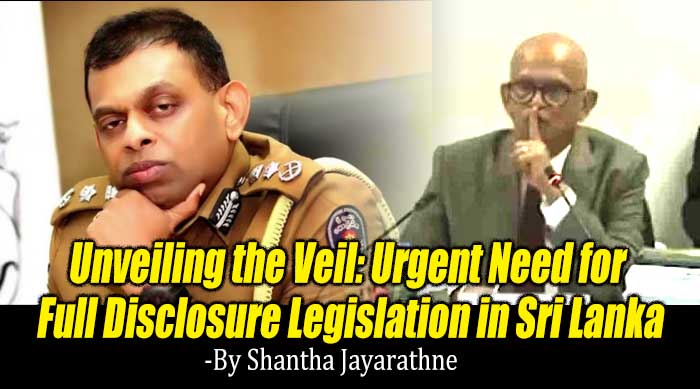-By Shantha Jayarathne

(Lanka-e-News -18.Nov.2023, 10.05 PM) In the aftermath of recent revelations, the urgent question echoing across Sri Lanka is whether it's high time to establish comprehensive legislation mandating Full Disclosure for policymakers and bureaucrats. Recent events have peeled back the layers of governance, exposing a web of conflicts of interest, questionable affiliations, and a concerning lack of transparency that has penetrated the very core of our political structures.
In the past weeks, disconcerting truths have emerged, with a Senior Deputy Inspector General (SDIG) being revealed as part of the controversial Sri Lanka Cricket (SLC) payroll. Adding to the dismay, reports surfaced about the Chairman of the Committee on Public Enterprises (COPE) sharing a similar payroll connection while purportedly investigating alleged misdeeds at SLC. The evident conflict of interest came to light when COPE Chair Ranjith Bandara's affiliation with SLC was flagged by third parties.
The failure of a senior police officer and the COPE Chair to voluntarily disclose their affiliations until external intervention underscores a pervasive issue in Sri Lanka. This lack of transparency is emblematic of a larger problem — one that fuels the rampant influence and corruption within our governance structures. It reflects a pattern where those in high offices conveniently sidestep the ethical imperative of disclosing affiliations that could compromise their impartiality.
In most accountable democracies, revelation of such conflicts of interest prompts resignations from implicated individuals. However, in Sri Lanka, the refrain seems to echo the sentiment that "Even though that happens in England, it doesn't happen in Sri Lanka." Neither the SDIG nor individuals involved in investigations have taken the ethical step of resigning or distancing themselves from the processes they are embroiled in. This failure to address conflicts of interest perpetuates a culture of corruption and raises serious questions about the integrity of our governance.
Recent calls for an investigation into affiliations further amplify the urgency for reform. The lack of disclosure regarding consultancy work and continued roles during inquiries points to a systemic flaw that requires immediate attention. The promise to "look into it and report back" only underscores the need for a more robust and accountable system.
Unlike many democracies, Sri Lanka lacks a vigorous vetting process for those appointed to high office. In countries like the United Kingdom, comprehensive vetting examines potential officials' conflicts of interest, affiliations, criminal records, and political leanings. This thorough approach ensures that individuals with questionable backgrounds or conflicting interests do not assume positions of influence. Unfortunately, Sri Lanka persists in an ineffective and corruption-riddled governance culture, lagging behind international best practices.
The call for full disclosure extends beyond personal affiliations to encompass national policies. The questioning of the President's failure to disclose details of the proposed Value Added Tax (VAT) increase underscores the need for transparency in governmental financial matters. Full disclosure about the items affected by the VAT hike is not just a responsibility; it is a democratic right that the public is entitled to exercise.
As the layers of non-disclosure unravel within our governance structure, the undeniable urgency for change takes center stage. The call for full disclosure legislation transcends a mere plea; it stands as a mandate for a reformed, transparent, and accountable Sri Lanka. The public's right to know is not negotiable; it is an essential pillar upon which a thriving democracy stands.
Sri Lankans must acknowledge that expecting such reforms from the current rulers, who have perpetuated this system, is futile. This corrupt political culture sustains them, as they have no existence without such a system. It is imperative to break free from the chains of this corrupt political narrative and embrace a different path.
The time has come for the people to think differently, to choose a political force that has demonstrated through action a commitment to change this corrupt political culture. Sri Lankans should seize this opportunity to uproot an extremely corrupt system at the first available instance. Let this be the rallying cry for a Sri Lanka that boldly embraces openness, integrity, and a governance system truly worthy of its people.
Former Senior Consultant
Sri Lanka Institute of Development Administration (SLIDA)
[email protected]
---------------------------
by (2023-11-18 16:46:20)
Leave a Reply